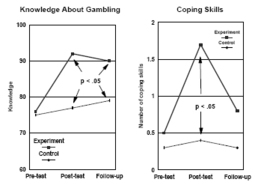Although recent research has shown that 4.4-7.4% of adolescents in North America can be diagnosed as pathological gamblers, and a much larger percentage of adolescents gamble illegally, little work has been done in the area of prevention. Gaboury and Ladouceur1 recently conducted an evaluation of a prevention program for pathological gambling among adolescents in the Quebec city area which included information and strategies for coping with gambling behavior. The prevention program was initiated in five junior and four senior classes among 134 students; nine matched classes constituted the control group (n=155). The program consisted of three 75 minutes sessions conducted over a 3-week period. The sessions included information about gambling, gambling behaviors, pathological gambling, and a quiz on gambling-related questions. The evaluation of the program found that the experimental group (those who received the prevention program) significantly improved their knowledge toward gambling compared with the control group at post-test and 6-month follow-up. Similarly, the experimental group reported significantly more skills for coping with gambling than the control group at post-test. The coping skills of these groups, however, did not remain significantly different at the 6-month follow-up. Like many efforts to prevent substance abusing behaviors**, this gambling prevention program did not have significant short-term effect on gambling behavior (e.g., frequency of gambling, presence of DSM-III-R criteria for pathological gambling).
Sources:
Gaboury, A., & Ladouceur, R. (1993). Evaluation of a prevention program for pathological gambling among adolescents. Journal of Primary Prevention, 14, 21-28
**Botvin, G.J., & Botvin, E.M. (1992). School-based and community-based prevention approaches. In J.H. Lowinson, P. Ruiz, R.B. Millman (Eds.), Substance abuse: A comprehensive textbook, (pp. 910-927). Baltimore, MD: Williams & Wilkins.
This public education project is funded, in part, by The Andrews Foundation and the Massachusetts Department of Public Health.
This fax may be copied without permission. Please cite The WAGER as the source.
For more information contact the Massachusetts Council on Compulsive Gambling,
190 High Street, Suite 6, Boston, MA 02110.





